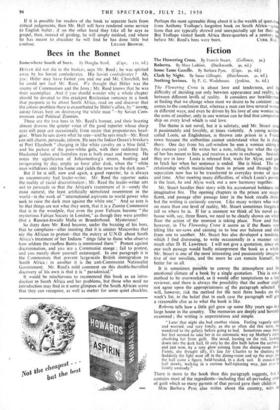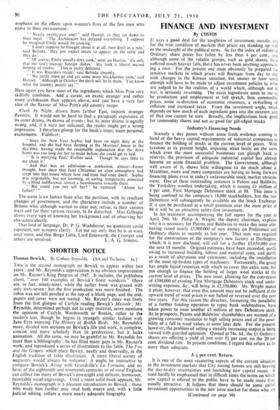Fiction
The Flowering Cross is about love and tenderness, and tit difficulty of deciding:not only between appearance and reality, bu between different levels of reality. It considers our bewildermen at finding that we change when most we desire to be constant ; a comes to the conclusion that, whereas a man can love several wome in different ways, and even be driven by his love of one woman in the arms of another, only in one woman can he find that companio ship on every level which* is real love.
The theme is not novel, but it is salutary, and Mr. Stuart sta it passionately and forcibly, at times violently. A young sculpt called Louis, an Englishman, is thrown into prison in a Frenc town because the authorities cannot understand what he is doing there. One day from his cell-window he sees, a woman sitting in the exercise yard. He writes her a note, telling her what the sig of her has meant to him, and receives a note in exchange. Instantl they are in love Louis is released first, waits for Alyse, and gee to fetch her when her sentence is ended. She is blind. The real relationship which maintained them in prison and through theit separation now has to be transferred to everyday terms of space and time. After meeting many difficulties, of which Louis's poverty is the least, he and Alyse work out a new harmony' together.
Mr. Stuart handles their story with his accustomed boldness and imaginative fire. The opening chapters -in the prison are -magni• ficent, and passage. after passage later in the book reealls. them; but the writing is curiously uneven. Like many writers who work on more than one level of reality, Mr. Stuart sometimes forgets to tell us where he is. If for a moment we think of his -novel as a house with, say, three floors, we need to be clearly shown on which floor the action of the moment is taking place. Now and then, however, in The Flowering Cross it seems as if the floors were tilting like see-saws and causing us to lose our balance and slide from one to another. Mr. Stuart has also developed a tendency, which I. find distressing, to write occasionally in a manner very much after D. H. Lawrence. I will not give a quotation, since any one such passage would badly misrepresent the book as a whole. Mr. Stuart is one of the most interesting and passionately imagina- tive of our novelists, and the more he can remain himself, the better for us all.
It is sometimes possible to convey the atmosphere and, the emotional climate of a book by a single quotation. This is not a Method to be overworked, as it would offer temptations to a lazy reviewer, and there is always the possibility that the author might not agree upon the appropriateness of the paragraph selected. I will, however, risk the method for tire next three books on this week's list, in the belief that in each case the paragraph will give a reasonable clue as to what the book is like.
Roberta tells how a little girl grew up some fifty years ago in a large house in the country. The memories are deeply And honestly examined ; the writing is- unpretentious and simple.
" Later that night she had another vision. Feeling vaguely upset and worried, and very lonely, as she so often did this term, she wandered to the gallery before going to bed. Sometimes once there, her feet seemed to take her in an automatic way up Mother's stairs, absolving her from guilt. She stood, leaning on the rail, looking down into the dark hall, lit only by the dim bulb below the archway, and just now, by a rosy glow coming from the dining-room door. Funny, she thought idly, it's late for Charles to be shutting tIP. Suddenly the light went off in the dining-room and up the steps rota the hall came a figure, bald-headed, in a dark suit. It crossed the hall slowly, walking in 'a curious half-tiptoeing way, just ever sn faintly unsteady."
There is more to the .book than this paragraph suggests, but it contains most of the ingredients—including that all-pervading sense of guilt which so many parents of that period gave their children. Miss Barbara Pym also writes about the country, with an
emphasis on the effects upon women's lives of the few men who move in their environment:
" ' Nearly twenty-past one! " said Harriet, as they sat down to their meal. 'The Archdeacon has .delayed everything. I suppose he imagined Emily would be cooking.'
" ' I don't suppose he thought about it at all, men don't as a rule,' said Belinda, 'they just expect meals to appear on the table and they do.'
" • Of course, Emily usually does cook,' went on Harriet, it's only that she can't manage foreign dishes' She took a liberal second helping of risotto. This is really delicious.'
" • It was Ricardo's recipe,' said Belinda absently.
" ' We really must go and get some more blackberries soon,' said Harriet. Although in October the devil will be in them. You know what the country people say.' " Here again you have most of the ingredients which Miss Pym very skilfully combines. Add a curate, an exotic stranger and rather more archdeacon than appears above, and you have a very fair idea of the flavour of Miss Pym's old country recipe.
Clash by Night, drawn from farther East, imports stronger flavours. It would not be hard to find a paragraph expressive of its outer drama, its drama of events..; but its inner drama is equally strong, and, if it were not indicated, the reader might get a wrong impression. I therefore plump for the book's inner, more personal, excitements. Videlicet:
"Since the New Year Sophie had been on night duty at the hospital, and she had been sleeping at the Morrises' house in the day-time, having made the reasonable explanation that the drive home was too long for her to make before she could get to bed. It is worrying Paul,' Eveline said. Though he says little to me about it.'
" And that was an admissiona confession, almost—Foster thought, how since that fatal Christmas an alien atmosphere had crept into that house where love and trust had once dwelt. Sophie was responsible, but not knowing, or caring, temporarily possessed by a blind indifference, almost a heartlessness towards them.
" But could you not tell her? ' he ventured. About her father? ' " The scene is an Indian State after the partition, with its resultant changes of government, and the characters include a number of Britons who, although warned to clear out, refuse, in their various ways and for their various reasons, to be disturbed. Miss Gillespie shows every sign of knowing her background and of observing her characters clearly.
That lord of language, Dr. P. G. Wodehouse, no quotation could represent, nor synopsis clarify. Let me say only that he is at work once more, and that Bingo Little, Lord Emsworth, the Crumpet and



































 Previous page
Previous page